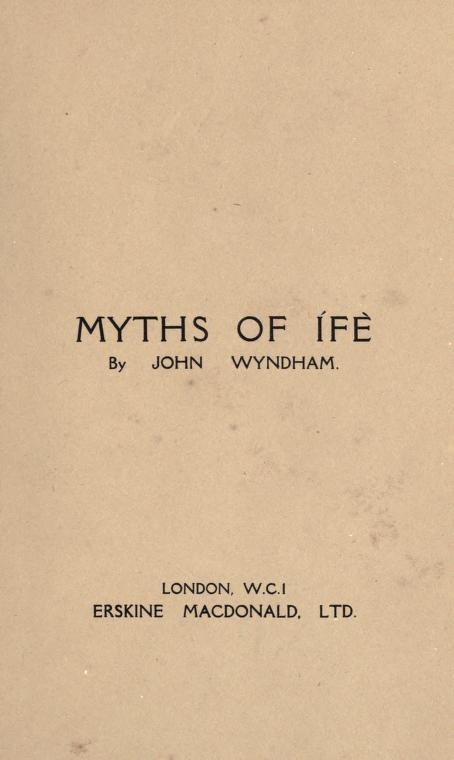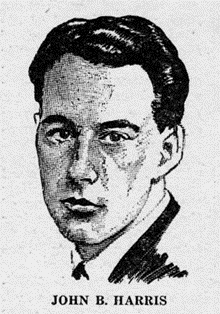Title of the work
Country of the First Edition
Country/countries of popularity
Original Language
First Edition Details
Wyndham, John, “The Beginning” in Myths of Ífè, London: Erskine Macdonald, 1921, 13–19.
ISBN
Available Onllne
Myths of Ífè. The Beginning available at Internet Archive (accessed April 5, 2022).
Genre
Myths
Target Audience
Crossover
Cover

Retrieved from Internet Archive (accessed: April 5, 2022).
Author of the Entry:
Eleanor A. Dasi, University of Yaoundé I, wandasi5@yahoo.com
Peer-reviewer of the Entry:
Daniel A. Nkemleke, University of Yaoundé 1, nkemlekedan@yahoo.com
Divine Che Neba, University of Yaoundé 1, nebankiwang@yahoo.com
Elizabeth Hale, University of New England, ehale@une.edu.au

Wyndham (Harris) as pictured in the May 1931 Wonder Stories. Retrieved from Wikipedia, public domain (accessed: April 10, 2020).
John Wyndham
[John B. Harris] , 1903 - 1969
(Author)
Wyndham was a literary writer, born in Birmingham, Warwickshire, England. At the age of 8 when his parents divorced, he attended the Bedales School in Hampshire, a private boarding school. By 1925 he was already a renowned science-fiction writer, using the pseudonym John Beynon Harris. His most popular novels are The Day of the Triffids (1951), The Kraken Wakes (1953), and The Chrysalids (1955). His short story collections are Consider Her Ways (1961) and The Seeds of Time (1969). He wrote the short book Myths of Ífè (1921) during the years that he spent in Nigeria as an Assistant District officer among the Yoruba.
Sources:
Britannica.com (accessed: April 10, 2020).
Bio prepred by Eleanor A. Dasi, University of Yaoundé I, wandasi5@yahoo.com
Summary
Narrated in blank verse, a style appropriate for legends, as the author claims, the myth relates the life of origin of Ífè*, originally told by the highest authorities of the Yoruba land to a stranger. At the beginning there was Arámfè the God of Thunder and Father of the Gods, who reigned in the realm of heaven. He summoned his sons and narrated to them how he created all the bounties in heaven and gave them eternal peace. His sons questioned him about their abilities; he outlined what each had and instructed them to create the Yoruba land. Orísha** had to create the world and Odúwa*** had to create man and rule over him. Arámfè gave Orísha a bag of Wisdom, full of arts and gave Odúwa the kingship and younger sons were to accompany them with chorus, dance, worship and the crafts. As they left heaven to the world, Odúwa made Orísha drunk and stole his bag. When Odúwa arrived at the edge of heaven, he cast the sand on the sea, and that was the origin of the world of conflicts. Years of darkness passed till the sun came and the sons vanished to the calm hills and life was like the one in times of the gods. Dum’la**** was charged to be the father of mourners, protector of shrines and messenger of the gods on Earth.
* According to Yoruba cosmogony, Ífè is the place of creation. Today, it has survived as the hub of Yoruba traditional religion and culture.
** Creator of the world. Son of Arámfè.
*** King of men. Son of Arámfè.
**** The ancestor of the Órnís of Ífè.
Analysis
There are a plethora of myths on creation around the world and this myth is a part of one of such, which relates the creation of the world in Yoruba cosmogony. Many of these myths hold a Supreme Being or god as the creator of the world. These gods created other smaller gods or assigned their children to control other aspects of creation. The gods also assigned emissaries or mediators between them and humans as is the role of Dum’la in the story. These mediators also had to be the protector of the shrines where the gods were to be worshipped.
The myth also foregrounds the desire of a god to be at the helm, which desire brings about rivalry and conflict. This desire is manifested by Oduwa, who took Orísha’s bag of Wisdom so that he can dominate the world. In all, this portion of the myth exposes us to how the Yoruba land came into being, and the making of its cosmogony.
Further Reading
Bolaji, Idowu, Olódùmarè: God in Yoruba Belief, Ikeja: Longman, 1982.
Courlander, Harold, Tales of Yoruba Gods and Heroes, New York: Crown Publishers, 1973.
Sprout, Barbara, Primal Myths: Creation around the World, San Francisco: Harper Collins, 1979.
Von Franz, Marie-Louise, Creation Myths, Boston: Shambhala, 1995.
Addenda
Although these myths were collected so many years ago, they are still being told to children and young adults in traditional African communities. And like all other oral narratives, several versions of the same story may be available in different places.


